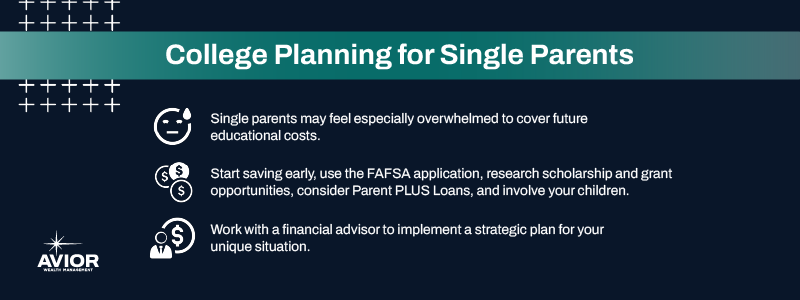College Planning for Single Parents
Learn the simple steps you can take right now with college planning to ensure a bright and financially secure future for your children.

You don’t have to wait until your child is older to start planning for college; in fact, the earlier you start saving up for tuition costs, the better!
Having a plan in place provides more flexibility when your child graduates and helps you maximize your savings over time. That’s why over half of college-bound families (53%) have a plan to pay for college, and a college savings fund is the most popular way to do it.
Single parents, in particular, may be overwhelmed with college savings options and education planning strategies, but taking the time to establish a solid education plan now will pay off (and save you from unnecessary stress) in the long run.
Read on to learn how to navigate the financial challenges of higher education and ensure your children’s success.
Challenges of Education Planning for Single Parents
As a single parent, it’s easy to get lost in the numbers of college planning and fall victim to extreme emotional stress, especially if you’re balancing your other financial responsibilities while managing a household on a single income.
Additionally, single parents may need more time to navigate the complex financial aid process, scholarship applications, and college admissions. The pressure to be the sole provider for your children may compound these issues.
However, careful planning, the right resources, and working with a financial advisor can help you create a manageable strategy despite these challenges.
Seven Steps for College Planning as a Single Parent
So, as a single parent, what can you do right now to start preparing?
Here are a few strategies that will help you ease stress and set up your children for a successful future.
1. Start Early
Starting early with college planning is crucial. The sooner you begin saving, the more time your investments have to grow and accumulate.
Set aside small amounts regularly, and you can reduce the burden of tuition and other college expenses for your children when the time comes.
Early planning also allows you to explore different savings options, like the popular 529 plans, educational trusts, or other tax-advantaged accounts, helping you get a head start on financial security.
2. Explore Financial Aid Options With a FAFSA
Don’t overlook financial aid opportunities. These can include federal and state grants, loans, and scholarships.
Start by completing the Free Application for Federal Student Aid (FAFSA), which will determine your eligibility for aid.
3. Consider Community College and Trade Schools
Community colleges and trade schools are great alternatives to traditional four-year universities, especially for single parents looking for affordable options.
These institutions often offer lower tuition rates, allowing students to save money in their first couple years of education.
Many community colleges also have transfer agreements with larger universities, so students can complete their degrees at a fraction of the cost and still graduate with a degree from a four-year university.
Trade schools provide specialized training that can lead to well-paying jobs that don’t require a four-year degree, offering a faster and more affordable path to graduation and job placement.
4. Explore Scholarships and Work-Study Programs
College work-study programs and scholarships can be valuable opportunities for single-parent households to offset college costs and stress.
Work-study programs allow students to work part-time while studying, helping to cover educational expenses without taking on additional debt.
Scholarships are available based on factors like merit, financial need, or other criteria and provide funding that doesn’t need to be repaid. Encourage your children to start searching early and apply for as many scholarships as possible to maximize scholarship opportunities.
Local community organizations, professional associations, and online databases are great resources for finding scholarships.
5. Budget Wisely
It’s also essential to budget wisely. As a single parent, you’ll need to account for tuition, room and board, textbooks, other associated fees, and personal and living expenses.
Establishing a realistic budget can help you prioritize spending and keep your kids from taking on unnecessary and cumbersome debt. Break down all potential costs and explore ways to reduce them, such as electing for more affordable housing options or used textbooks.
6. Research Parent PLUS Loans
Parent PLUS loans can help single parents bridge the gap between the financial aid received and the total cost of college. These federal loans allow you to borrow money to cover your child’s education expenses, but they come with pros and cons.
On the plus side, Parent PLUS loans offer flexible repayment options and a fixed interest rate. But they do require a credit check, and repayment responsibility lies solely with the parent, potentially adding to long-term financial burdens.
Before applying, talk through this option with a financial professional who knows your situation.
7. Involve Your Children
The funding options you choose may depend on your child’s unique goals and dreams. Involve them in their education planning.
Help them set up academic and career goals when the time comes, and walk them through the associated costs.
Then, as a family, you can make strategic long-term decisions.
Secure Your Child’s Education With Help From Avior
You’re already spinning enough plates as a single parent. It’s likely that the mere thought of long-term education planning only adds to that stress. But starting early and understanding your options, like 529 college savings plans and educational trusts, will help you maximize your savings and ensure your children are set up for success.
At Avior, we know how important these considerations are for your family. We’ll get to know your unique situation, work with you to set a budget, and help you identify and implement the best college planning solutions that you can afford.
Set up a one-on-one consultation with Avior today to get started.
Disclaimer: Nothing contained herein should be construed as legal or tax advice. Avior and our Advisors will work with your attorney and/or tax professional to assist with your legal and tax strategies. Please consult your attorney or tax professional with specific legal and/or tax questions. Investment Management and Financial Planner are offered through Avior Wealth Management, LLC, an SEC-registered investment advisor. Past performance is not a guarantee of future results. Investments are subject to loss, including the loss of principal.
No Comments
Sorry, the comment form is closed at this time.




